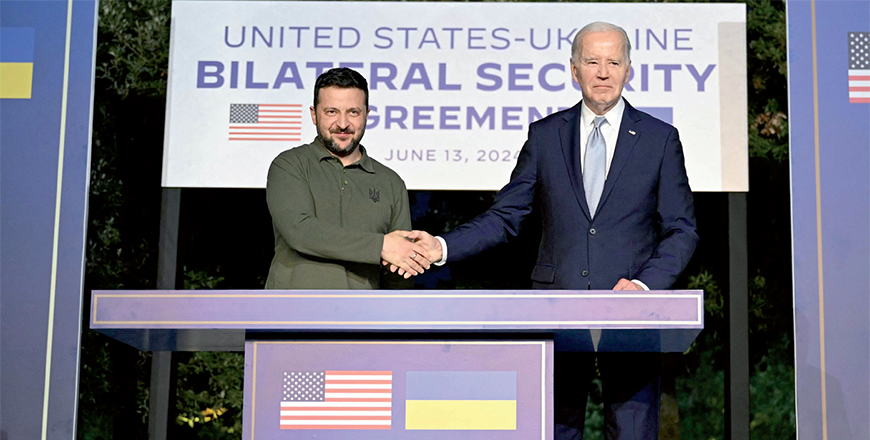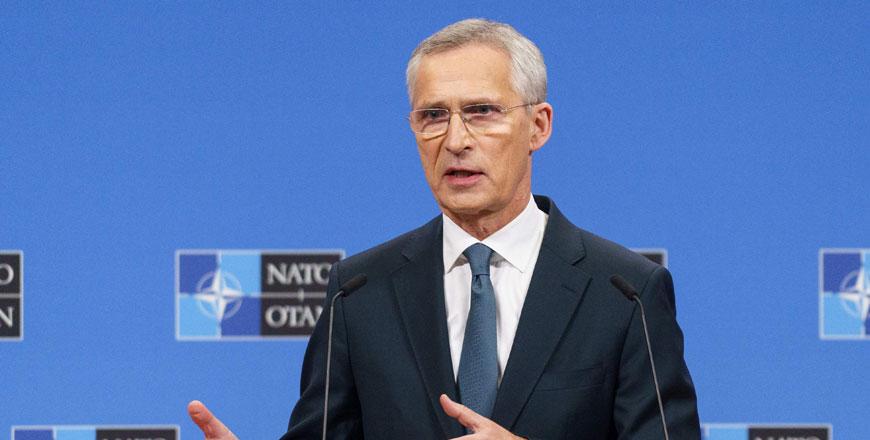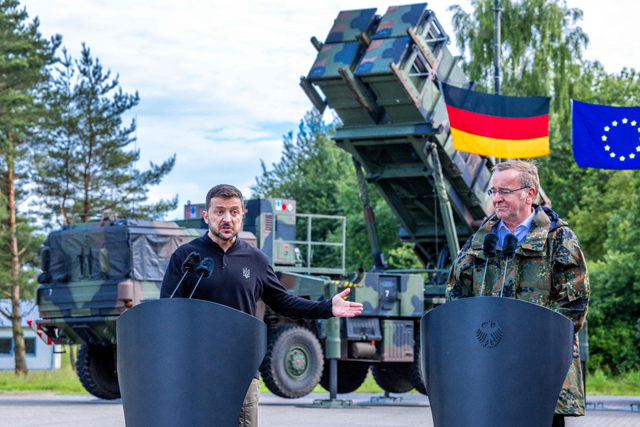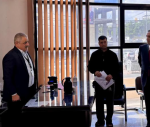You are here
Zelensky's diplomatic offensive draws leaders to Swiss peace summit
By AFP - Jun 14,2024 - Last updated at Jun 14,2024

US President Joe Biden and Ukrainian President Volodymyr Zelensky give a press conference at the Masseria San Domenico on the sidelines of the G-7 Summit hosted by Italy in Apulia region, on Thursday in Savelletri (AFP photo)
WARSAW — When heads of state and senior officials from some 90 countries gather in Switzerland this weekend to discuss Kyiv's proposed plan to end the war in Ukraine, it will be largely due to one person: Volodymyr Zelensky.
The former TV comedian won widespread respect and drew comparisons with Winston Churchill when he stayed in Kyiv in February 2022 to lead his country in a David-versus-Goliath battle against the invading Russian army.
Two years later with tens of thousands of lives lost despite billions of dollars of Western aid and donated military equipment, the charismatic president has embarked on a months-long drive to charm, coerce, plead and threaten some of the most powerful people in the world into turning up at his flagship peace summit in a Swiss mountainside resort.
That dozens will be there — many from the Global South — at a time when Ukraine is on the backfoot militarily, and with talk of war fatigue growing, is an impressive feat.
The dignitaries are coming despite Russia — which began the full-scale war in Ukraine in 2022 — not being invited.
"It's rather remarkable that there's 100 countries showing up to a peace summit at which the main instigator of that conflict is not participating," said Max Bergmann, a former US State Department official.
"It's a diplomatic masterstroke," Bergmann, who now heads the Europe, Russia and Eurasia Programme at the Centre for Strategic and International Studies (CSIS), said.
William Courtney, a former US diplomat, called it a "huge success", saying: "I can't think of any other middle power, like a Saudi Arabia or Brazil, that have done anything comparable."
Zelensky has made corralling world leaders to attend the June 15-16 forum one of the key tasks this year.
And he has hit the skies to push the message in person, visiting 16 countries in 2024, including stops in the Middle East and Asia.
The day before a G7 meeting in Italy, where Zelensky will speak, he was in Saudi Arabia, Russia’s key energy ally.
He also visited Singapore, the Philippines and Qatar this month, following a whistlestop tour of European capitals.
Charm and coerce
At meetings with presidents and prime ministers, in addresses to parliaments and conferences, he has lavished praise on his hosts.
“I am grateful to President [Emmanuel] Macron for always striving to find the best solution to protect us and the entire Europe. I appreciate the bravery of his decisions and France’s leadership,” he said after a meeting with Macron at D-Day commemorations in Normandy.
He has also not shied away from taking a harder message at times.
“If there is no representative of your state, this is a public response that when you say ‘we all want peace’, no, you want Russia to win,” Zelensky said in an interview with AFP in May.
That public show of frustration has extended to calling out US President Joe Biden, Kyiv’s most important backer, and Chinese leader Xi Jinping, who he accused of enabling Russia’s invasion after weeks of outreach failed to secure Chinese attendance.
“If he is not present, it will be just like applauding Putin: personally applauding and doing so standing,” Zelensky said about Biden’s participation in the Swiss summit.
Those efforts proved unsuccessful, with Washington to be represented by Vice President Kamala Harris.
For some, there have been diplomatic missteps in the run-up to the summit.
“Ukraine’s impatience ... has sometimes rubbed other capitals the wrong way,” said Alissa de Carbonnel, deputy programme director for Europe at Crisis Group.
Zelensky has also been “less successful” in getting countries outside of Kyiv’s traditional backers to more forcefully support Ukraine’s position, said Simon Smith, a former British ambassador to Ukraine.
“I don’t think this is a failure of his diplomatic style,” Smith told AFP.
“It’s just harder for him to persuade other countries to share his outrage at what Russia is doing, when those countries do not perceive themselves as threatened by Russia.”
‘Magnetism’
The summit will also be a show of how Zelensky’s diplomacy has evolved since the start of the war.
For Courtney, he has become more “skilful” on the world stage, notably travelling more regularly to drum up support for Ukraine and press the flesh in key capitals.
But while Zelesnky has lent on his pulling power to bring in the delegations, “he has lost some of his magnetism that he had in 2022”, said Bergmann.
“There’s an air of perhaps over-exposure. Everybody’s heard the lines and heard the message, repeated again and again ... it reduces some of the novelty,” Bergmann said.
For the man himself, the very fact the gathering is taking place is a “positive” result.
Whether he can secure more than just a high turnout is a key test, especially among non-Western countries so far happy to tread a path between Moscow and Kyiv.
“Zelensky can still achieve a lot. Contacts with heads of states matter,” said Orysia Lutsevych, head of Chatham House’s Ukraine Forum.
But “positions will be changing depending on the situation on the battlefield”, she added.
“Countries tend to back the winner and so far they are not sure who will win.”
Related Articles
WASHINGTON — NATO's 75th anniversary summit was meant to showcase the triumph of a larger, stronger alliance.
BERLIN — German far-right and left-wing nationalist lawmakers boycotted a parliamentary address on Tuesday by Ukrainian President Volodymyr
BERLIN/ KYIV — Any decision to send F16 fighter jets to Ukraine will fall on the White House, the UK and German defence ministers said Wedne

















